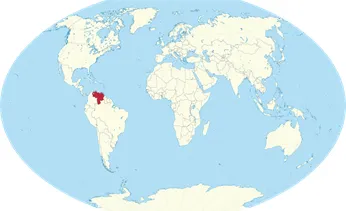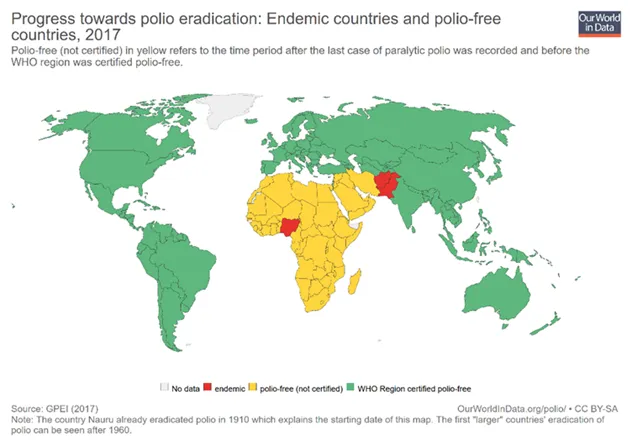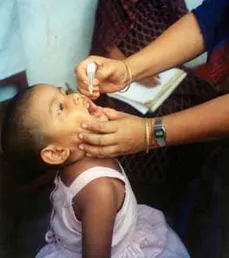
Good news everyone, polio has not returned to Venezuela!
On 29th April a two year old boy from the rural north-eastern part of the country was found with symptoms of acute flaccid paralysis (AFP). While the poliovirus and vaccine-derived poliovirus are two possible cause of AFP, this case thankfully was found to be neither 1.
The story of this possible case has been widely reported over the last few weeks, however the correction has received less coverage. So I thought today would be a good day to have a little refresher on the Polio eradication program and why a single case such as this does deserved to be news in the first place.
Global Polio Eradication
Why aim to eradicate Polio? In a word, paralysis.
When thinking about global health it is common to talk in terms of improving life expectance, this statistic however only accounts for part of the story of human wellbeing. Another important aspect is the suffering that individuals may be expected to experience during their lifetime. This is a factor that we take into account with the statistic known as the Disability Adjusted Life Year (DALY)
In short, we care about turning lives that look like this:

And lives like this:

Into lives that look like this:

When we look at polio eradication, the second scenario is what we are trying to prevent. The distinction here is important, as some will point to deaths linked to polio as an example of the vaccine not being overly necessary or effective. This is disingenuous use of the stats in my opinion.
In 1988, 350,000 cases of polio were reported, and every day more than 1000 children worldwide were paralysed as a consequence 2. 1988 was also the year when the world declared polio as the next virus to be targeted for complete eradication from the earth. Like smallpox (officially eradicated on the 9th December 1979 3), polio has no non-human reservoir (i.e. it only reproduces in humans) so once transmission has completely come to a stop in humans, the virus becomes extinct. As such, we’ll be able to check polio off our global to do list and no longer have to vaccinate for it ever again.
In my mind, the eradication of polio will shift the moon landing into third place of humanities biggest achievements (smallpox being at number 1). That is how big of a deal getting this job done is.
So as you can imagine in 2001 when only 483 cases were reported 4 everyone in the global health community thought that eradication was just around the corner.
It was not.
Why the last mile is proving so difficult?
During the first 13 years of the polio eradication effort (1988 – 2001) we achieved 99.9% of our goal. A large part of this was due to the amazing Oral Polio Vaccine (OPV) designed by Jonas Salks. This vaccine is spectacularly easy to administer due to it just involving a few drops on the tongue (or on a sugar cube), therefore a health worker needs little to no training in order to quickly vaccinate a large population. It also has the added “feature” of being passed through the body into the local sewage system where in some low-income countries the vaccine goes on to provide immunity to those children that haven’t received direct vaccination (bonus vaccination!).
After the great early success of the eradication initiative, 2002 saw the number of cases per year increase and stayed steady at around 1000-2000 a year until 2015 when it decreased to 98 cases, and then to 37 cases in 2016, and then to 22 cases in 2017. Leaving us today with only two countries in the world where wild polio cases are still thought to be spreading: Afghanistan and Pakistan (certification takes three years without spreading and is only awarded to an entire region). [edit made here as I originally didn't realise that Nigeria had their last case in 2016, thank you to @teekingtv for pointing this out]

There are two factors that mean that we are so close but still so far when it comes to eradication and one factor that may stop us achieving our goal altogether.
OPV can cause paralysis
It’s a wonderful vaccine however the oral polio vaccine can cause also cause acute flaccid paralysis through what is known as Type 2 or vaccine derived poliovirus 5. This is rare at only 1 in 1.5 million children vaccinated with OPV (far better odds than if you get polio) however, these are still unacceptable odds for many countries. As such, the countries that eliminated polio within their borders switched to the safer, yet harder to administer and less effective, intravenous polio vaccine (IPV). In 2015/16 as part of the end game strategy for polio 6, the whole world switched from OPV to IPV. In a two week period!
This may have been the biggest logistical exercises in human history as every vaccination center in every low income countries and most mid-income countries all had to safely dispose of the OPV and have a stock of the IPV ready to continue the vaccination process.
So when the suspected case occurred in Venezuela my first though was that it would be this type two vaccine derived poliovirus, perhaps due to the improper disposal of OPV (or perhaps it being sold on the black market). Thankfully, it was not.
The CIA use a fake vaccination team to find Osama bin Laden
Yes. This one choice may have extended the polio eradication program by around a decade, not to mention the additional deaths of polio vaccinators. Since 2010 the US government have acknowledge this issue and have vowed never to use vaccination as a cover for an operation again 7, but still, come on guys can’t you see we’re trying to do a thing here!
Only cost will stop us now
We can’t talk about the disease eradication initiatives without talking about how ruinously expensive they are. From a short-term view the polio eradication initiative can seem highly cost-ineffective, with billions of dollars over the next few years being donated to prevent what will ultimately only be tens of cases 8. However, we’ve got to the stage now where if we don’t finish the job, rates will quickly spring back to levels even higher than they were at previously 9.
Final thoughts
At this point in time if a case of polio were to have been found in Venezuela this would have been devastating news. It would indicate a catastrophic issue with our global surveillance of the virus, and if surveillance were to have confirmed the case as being cause by either the virus or the vaccine derived virus you can bet for sure that other cases wouldn’t have been far behind. From what I can tell from those that work closely in the area, eradication of Polio will likely be confirmed within the next 5 years. Although this experience has led to some within global health seriously reconsidering committing to other ambitious eradication efforts in the future 9, many argue (including me) for sustained improvement of all health services within a country. If we all come up together, eradication will be an inevitability.
About me
My name is Richard, I blog under the name of @nonzerosum. I’m a PhD student at the London School of Hygiene and Tropical Medicine. I write mostly on Global Health, Effective Altruism and The Psychology of Vaccine Hesitancy. If you’d like to read more on these topics in the future follow me here on steemit or on twitter @RichClarkePsy.
References:
[1] CNN: Polio has not returned to Venezuela, WHO says
[2] The Polio Global Eradication Initiative: History of Polio
[3] World Health Organisation: Smallpox. Emergencies preparedness, response
[4] Centers for Disease Control and Prevention (CDC. (2006). Update on vaccine-derived polioviruses. MMWR. Morbidity and mortality weekly report, 55(40), 1093.
[5] World Health Organisation: What is vaccine-derived polio?
[6] World Health Organisation: About the Polio Endgame Strategic Plan
[7] ABC News: US vows CIA will not stage fake vaccine programs, amid backlash over use in hunt for Osama bin Laden
[8] The Polio Global Eradication Initiative: Economic Case for Eradicating Polio
